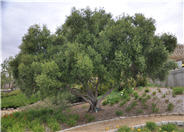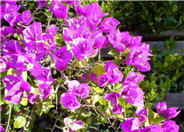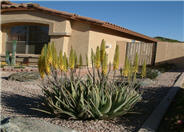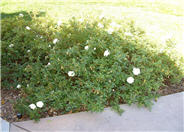
Common name:Olive, European Olive
Botanical name:Olea europaea
This broad tree will grow to 40' tall and has small, gray green leaves with fleshy black fruit that appears in fall.

Common name:Bougainvillea
Botanical name:Bougainvillea spectabilis
This species is hardy and vigorous, with a showy, ornamental display of purple color. It blooms well in areas with cool summers.

Common name:Aloe Vera or Medicinal Aloe
Botanical name:Aloe vera
The rosette of this plant consists of fleshy gray green leaves, which are narrow, succulent and erect with soft spines on margins. This Aloe is a slow to moderate grower. Flowers are spikes of yellow, 2'-3' tall and bloom late winter to summer. This aloe can form large clumps. It will tolerate full to partial sun, needs some supplemental water in heat and good drainage. It attracts hummingbirds. This aloe is a Mediterranean native. The sap is used for burns and abrasions.

Common name:Ivy Geranium
Botanical name:Pelargonium peltatum
Clouds of single or double flowers are produced from spring through fall on this plant, which should be planted in areas that receive afternoon shade in warm inland valleys. Foliage resembles ivy (pointed lobes) and are bright green and glossy. Ivy Geranium looks great in hanging baskets, window boxes or in planters. Do not use for erosion control.

Common name:Iceberg Floribunda Rose
Botanical name:Rosa 'Iceberg'
This is a shrub rose (there are climbing varieties) with an abundance of fragrant, medium sized, white blooms. It is one of the most popular roses and very tough.

Common name:Ground Cover Rose
Botanical name:Rosa Ground Cover varieties
There are many deciduous, evergreen and semi-deciduous roses that are used as groundcovers, usually reaching 2' in height. They look lovely draping a slope. Rosa groundcovers come in a variety of colors but all need full sun and a moderate amount of water to do well.
| Designer: Anon | Southwest Look |
Photographer: GardenSoft |
Soils and Compost:
Physical weed control, including mulching, or hand removal protects the watershed from harmful chemicals.
Water Saving Tip:
In general, lawns only need to be watered once every three days.
Check your irrigation controller and reduce watering times if necessary.
Integrated Pest Management:
Attract, or buy beneficial insects such as ladybugs and lacewings to control pest outbreaks in your garden.
